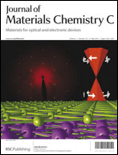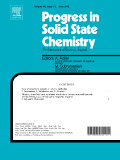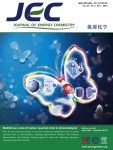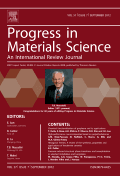
Materials Chemistry Frontiers
Scope & Guideline
Shaping Tomorrow’s Materials with Today’s Research
Introduction
Aims and Scopes
- Material Synthesis and Characterization:
The journal emphasizes the synthesis of novel materials, including organic-inorganic hybrids, metal-organic frameworks (MOFs), and nanostructures, as well as their detailed characterization to understand their properties and functionalities. - Energy Storage and Conversion:
Research in this journal often explores advanced materials for batteries, supercapacitors, and fuel cells, aiming at improving efficiency, stability, and sustainability of energy storage systems. - Photonic and Optoelectronic Materials:
There is a strong focus on materials for photonic applications, including light-emitting diodes (LEDs), solar cells, and photodetectors, emphasizing the design of materials with tailored optical properties. - Biomaterials and Environmental Applications:
The journal includes studies on biomaterials for medical applications and environmentally friendly materials for waste remediation and energy harvesting, highlighting the role of materials in sustainability. - Catalysis and Electrocatalysis:
A significant portion of the research is dedicated to the development of catalysts for various chemical reactions, particularly electrocatalysts for energy conversion processes like hydrogen evolution. - Nanomaterials and Nanotechnology:
The journal features research on nanomaterials, exploring their unique properties and applications in various domains, including drug delivery, sensing, and catalysis.
Trending and Emerging
- Hybrid and Composite Materials:
There is a growing interest in hybrid materials that combine organic and inorganic components, as well as composites that enhance performance in applications such as energy storage and sensing. - Sustainable and Green Materials:
Research focusing on sustainable materials, including bio-derived and recyclable substances, has gained momentum, reflecting a global push towards environmentally friendly practices. - Advanced Energy Storage Solutions:
Emerging themes in the development of next-generation batteries, such as sodium-ion and solid-state batteries, are becoming prominent, driven by the need for improved energy storage technologies. - Smart and Responsive Materials:
Materials that can respond to environmental stimuli (temperature, light, pH) are increasingly significant, particularly in applications for drug delivery and environmental sensing. - Two-Dimensional Materials:
Research into two-dimensional materials, such as MXenes and graphene derivatives, is on the rise due to their unique properties and potential applications in electronics, catalysis, and energy storage. - Photothermal and Photodynamic Therapies:
There is an increasing focus on materials for photothermal and photodynamic therapies in medical applications, particularly for cancer treatment, leveraging the unique optical properties of new materials.
Declining or Waning
- Conventional Organic Photovoltaics:
Research on traditional organic photovoltaics has waned as the field pivots towards more efficient and stable materials, such as perovskites and non-fullerene acceptors, which offer better performance metrics. - Traditional Inorganic Materials:
There appears to be a decreasing emphasis on purely inorganic materials without hybridization or nanostructuring, as researchers increasingly explore composite and multifunctional materials. - Static Materials for Low-Tech Applications:
Research focusing on static materials with limited functionalities has declined as the demand for smart, responsive, and multifunctional materials has increased, driven by advances in technology. - Basic Theoretical Studies:
The journal has shifted focus away from purely theoretical studies towards more application-driven research, which integrates theory with experimental validation. - Single-Function Materials:
Research on materials designed for single functions, such as just energy storage or just catalysis, is being replaced by studies on multifunctional materials that can perform multiple tasks simultaneously.
Similar Journals

Science China-Chemistry
Advancing the Frontiers of Chemical KnowledgeScience China-Chemistry, published by SCIENCE PRESS, stands as a leading journal in the field of chemistry, specifically recognized for its contributions in miscellaneous chemistry domains. With an impressive Q1 categorization in the 2023 quartiles and ranking at #35/408 in general chemistry by Scopus, this journal places itself within the top 91st percentile, showcasing its significant impact in the discipline. The journal, based in Beijing, China, provides a platform for innovative research, reviews, and insights that cater to an international audience of researchers, professionals, and students dedicated to advancing chemical science. As an open-access journal, it ensures widespread dissemination of knowledge, making cutting-edge research accessible to all. With converged years from 2010 to 2024, the journal continues to be a vital resource for those engaged with the latest developments in chemistry.

Journal of Ovonic Research
Exploring Innovative Pathways in Electronics and Optics.Journal of Ovonic Research is a distinguished publication dedicated to advancing the fields of electronic, optical, and magnetic materials. Published by VIRTUAL CO PHYSICS SRL, this journal offers a platform for researchers to share innovative findings and developments that push the boundaries of technology and materials science. With an ISSN of 1842-2403 and an E-ISSN of 1584-9953, it provides an important service to the academic community, particularly within Romania and beyond. Despite its recent inception in 2011, the journal has gained traction in the academic landscape, reflecting a Q4 quartile ranking in crucial categories such as Electronic, Optical and Magnetic Materials, as well as in Physics and Astronomy. The Scopus rankings further underscore its positioning, ranking within the 25th to 37th percentile across various disciplines, making it a valuable resource for professionals and students alike. Although the journal currently operates on a non-open access basis, it remains committed to exploring the latest advancements in materials science, encouraging interdisciplinary collaboration and fostering a deeper understanding of surface, coating, and film technologies. As the field evolves, Journal of Ovonic Research stands as a beacon for scholarly communication, bridging the gap between research and practical application.

Journal of Materials Chemistry C
Elevating Materials Science with Open Access InsightsJournal of Materials Chemistry C, published by the renowned Royal Society of Chemistry, is a leading academic journal focusing on innovative research in the field of materials chemistry. With an impressive impact factor, this journal has solidified its status as a top-tier publication within its field, ranking in the Q1 category for both Chemistry (miscellaneous) and Materials Chemistry as of 2023. Positioned at the forefront of -materials science, it serves as a vital platform for researchers, professionals, and students to disseminate findings that highlight the synthesis, characterization, and application of advanced materials. The journal's open access model allows for broader readership and engagement, ensuring that groundbreaking research is accessible to a global audience. As a result, the Journal of Materials Chemistry C plays a crucial role in advancing the understanding and technology of materials, fostering collaboration and innovation within this dynamic scientific community.

EnergyChem
Exploring Breakthroughs in Energy and Biomaterials.EnergyChem is a premier academic journal published by ELSEVIER, dedicated to advancing the field of energy chemistry and its applications in sustainable technologies. With a strong focus on biomaterials and innovative chemistry solutions, the journal has established itself as a leading platform within the research community, boasting remarkable rankings such as Q1 in Biomaterials, Chemistry (miscellaneous), and Energy (miscellaneous) for 2023. Notably, it ranks 2nd in both Materials Science and Energy categories, reflecting the high caliber of research it publishes, which is crucial for tackling pressing global energy challenges. Since its inception in 2019, EnergyChem has been committed to open and accessible research, making it an invaluable resource for researchers, professionals, and students striving for cutting-edge insights in energy conversion and storage. With its target audience in mind, the journal encourages submissions that explore innovative materials, processes, and applications that will contribute to a sustainable energy future.

ADVANCED FUNCTIONAL MATERIALS
Pioneering Innovations in Functional MaterialsADVANCED FUNCTIONAL MATERIALS is a leading journal published by WILEY-V C H VERLAG GMBH, prominently recognized in the fields of biomaterials, chemistry, condensed matter physics, and materials science. With an impressive impact factor and a distinguished position in the Q1 quartile across multiple categories including nanoscience and nanotechnology, this journal serves as a vital platform for researchers and professionals committed to innovating in functional materials. Since its inception in 2000, ADVANCED FUNCTIONAL MATERIALS has published high-quality peer-reviewed articles that push the boundaries of materials science, exploring new frontiers in electronic, optical, and magnetic materials. The journal's dedication to open access ensures that its groundbreaking findings are readily available to a global audience, fostering collaboration and knowledge-sharing among scholars and practitioners in the field. For those seeking to stay at the forefront of materials research, ADVANCED FUNCTIONAL MATERIALS is an essential resource.

Accounts of Materials Research
Empowering researchers with cutting-edge insights.Accounts of Materials Research is a premier journal published by the American Chemical Society, focusing on the multidimensional field of materials science. With a robust impact factor and a commitment to open-access research, it serves as a vital platform for leading-edge discoveries from 2020 to 2024. The journal has rapidly ascended to the top quartile in multiple categories, including Chemical Engineering, Materials Chemistry, and Polymers and Plastics, demonstrating its significant influence within the academic community. Recognized by Scopus as a key resource—with remarkable rankings that place it in the 95th percentile of its field—Accounts of Materials Research is devoted to publishing high-quality, innovative research that addresses critical challenges in materials development and implementation. This journal is essential for researchers, professionals, and students seeking to stay informed about the latest advancements and collaborative opportunities within the interdisciplinary landscape of materials science.

PROGRESS IN SOLID STATE CHEMISTRY
Advancing the Frontiers of Solid State ChemistryPROGRESS IN SOLID STATE CHEMISTRY, published by PERGAMON-ELSEVIER SCIENCE LTD, serves as a pivotal platform for disseminating cutting-edge research and advancements in the field of solid state chemistry. With an impressive impact factor and a respected status, this journal consistently ranks in the Q1 category across multiple disciplines, including Condensed Matter Physics, Materials Science, and Physical and Theoretical Chemistry. Following a rigorous peer-review process, it features articles that explore theoretical frameworks and experimental findings, thereby fostering innovation and collaboration among researchers and professionals. Although it does not adopt an open access model, its substantial reach and high Scopus rankings—19th in Condensed Matter Physics, 14th in Physical and Theoretical Chemistry, and 48th in General Materials Science—underscore its influence in shaping the future of materials research. Established in 1964, the journal continues to contribute significantly to the academic community, bridging the gap between theory and practical application in solid state materials.

Journal of Energy Chemistry
Pioneering Discoveries in Energy ChemistryThe Journal of Energy Chemistry, published by Elsevier, is a premier international journal that has established itself at the forefront of research in the fields of electrochemistry and energy technology. With an impressive impact factor, this journal is classified in the Q1 quartile across multiple categories including Energy Engineering and Power Technology, Fuel Technology, and Electrochemistry, underscoring its significant contribution to advancing knowledge and innovation in energy systems. Based in the Netherlands, the journal offers open access to its cutting-edge research, allowing for broad dissemination and engagement among researchers, professionals, and students alike. The scope of the journal spans crucial topics from chemical energy storage to sustainable energy solutions, making it an essential resource for those looking to understand and contribute to the evolving landscape of energy chemistry.

PROGRESS IN MATERIALS SCIENCE
Catalyzing Innovation in Material StudiesPROGRESS IN MATERIALS SCIENCE is an esteemed peer-reviewed journal published by Pergamon-Elsevier Science Ltd, focusing on pioneering advancements and comprehensive studies in the field of Materials Science. With an ISSN of 0079-6425 and an E-ISSN of 1873-2208, this journal boasts a prestigious status, ranking in the Q1 category for Materials Science (miscellaneous) and achieving a remarkable 99th percentile in Scopus rankings, positioned 4th out of 463 journals in General Materials Science. Published from the United Kingdom, PROGRESS IN MATERIALS SCIENCE provides critical insights into the latest discoveries, trends, and methodologies shaping the materials science landscape, making it an invaluable resource for researchers, professionals, and students alike. Readers can explore rich content on subjects ranging from nanomaterials to biomaterials and beyond, all designed to foster innovation and knowledge dissemination in the materials science community. Although it is not an open-access journal, it remains a pivotal platform for high-quality research and essential discourse in this dynamic field.

Frontiers in Materials
Unveiling Breakthroughs in Material Technologies.Frontiers in Materials, an esteemed journal published by FRONTIERS MEDIA SA, is a leading platform in the field of Materials Science, with a notable impact factor placing it in the Q2 category of its discipline as of 2023. Since its establishment as an Open Access journal in 2014, it has fostered considerable academic exchange, allowing researchers from around the globe to share their innovative findings and insights. Based in Lausanne, Switzerland, this journal not only emphasizes high-quality peer-reviewed articles but also prioritizes rapid dissemination of research, as evidenced by its commendable Scopus ranking of #62 out of 196 in Materials Science (miscellaneous). By consistently striving to bridge the gap between academia and practical applications, Frontiers in Materials serves as an invaluable resource for researchers, professionals, and students seeking to delve into cutting-edge advancements and transformative applications in materials science.